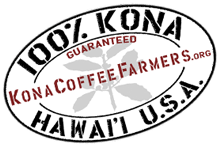Kona Coffee Farmers Association Questions to Candidates for US House of Representatives, District 2
Question One:
Counterfeiting and deceptive labeling of Kona and other Hawaii-grown coffee products occurs all too often on the Mainland–with adverse economic impact to Hawaii’s coffee growers and damage to the reputation of Hawaii-grown coffee. The federal Food and Drug Administration has ample authority to investigate and bring enforcement action against counterfeiting and deceptive labeling of coffee.
IF ELECTED, WILL YOU ENCOURAGE THE FDA TO ACT—TO INVESTIGATE AND TAKE APPROPRIATE LEGAL ACTION WHEN EVIDENCE OF FRAUD AND MISLEADING LABELING IS FOUND, AND TO PROMULGATE REGULATIONS FOR THE FAIR LABELING OF US-GROWN COFFEE PRODUCTS?
IF YES, WHAT STEPS WILL YOU TAKE TO ENCOURAGE ACTION BY THE FDA?
Responses from Candidates:
Noelle Famera: Yes
I will work to mandate and require that the FDA properly regulates, Authentic and counterfeit coffee beans—with labeling authentic brands and penalties to those who are counterfeiting and destroying our trade market.
Kai Kahele: [NOTE: Because regulations preclude the candidate from campaigning while on active military duty, this response and the response to Question Two, below, were “completed by the Kahele for Congress campaign staff “.]
Yes, Kai Kahele will continue to combat false labeling of Hawaiʻi-grown coffee. As a state senator, Kai has introduced legislation such as SB 895, a bill that would extend the offense of false labeling of Hawaiʻi-grown coffee to include roasted coffee. If elected to serve as U.S. Representative of Hawaiʻi’s second congressional district, Kai will conduct oversight of the U.S. Food and Drug Administration’s actions against false labeling of U.S.-grown coffee products, including Kona and other Hawaiʻi-grown coffee products.
Elise Hatsuko Kaneshiro: Yes, I will encourage the FDA to investigate where such products are coming from, to halt the production and dissemination of fraudulent or mislabeled coffee, and to create standards for oversight that will mitigate the instances of this occurring.
Robert K. Nagamine: Yes. I would need to examine ways I could encourage integrity in the system. As your representative, it is only natural to use any leverage to promote what is fair and right. Also, it is critical to vote for me as a Republican, representing you and Hawaii, because I could even explore ways to champion your cause with other Republicans or even with a bi-partisan effort. Hawaii needs to be foremost with my concerns and efforts. Let the conversation continue, if I am elected.
Question Two:
Since 1998 a USDA regulation (7 CFR Sec 319.73-2) has prohibited importation of green (unroasted) coffee beans into Hawaii and Puerto Rico, the only US commercial coffee growing areas. As noted in the regulation, importation of green coffee creates risks of spreading devastating coffee pests and diseases. As an example, “coffee berry borer” was introduced into Hawaii in 2010 with severe economic impact on our coffee farmers. Yet Hawaii has ignored, and continues to ignore, the federal regulation and has allowed tons of unroasted coffee beans to be imported annually, putting coffee farmers at risk of losing their trees and their livelihoods from “coffee rust” and other pests and diseases.
IF ELECTED, WILL YOU TAKE STEPS TO HAVE THE USDA EXPLAIN WHY IT IS NOT ENFORCING SECTION 319.73-2—PARTICULARLY IN LIGHT OF THE 2005 DENIAL BY USDA OF A FORMAL REQUEST FROM HAWAII TO AMEND THE REGULATION? [Note—the basis for the denial was that the Hawaii request posed too great a risk of introduction of coffee pests and diseases.]
Responses from Candidates:
Noelle Famera: Yes
I will work to direct the Department of Agricultural in mandating an agriculture inspection, for green coffee beans, that are not being roasted— before arrival. Those that do not meet the inspection requirements, will not be able to be transport to the island chain.
Kai Kahele: Yes, Kai Kahele supports the enforcement of 7 CFR Sec 319.73-2 to prohibit the importation of green coffee beans into Hawaiʻi and Puerto Rico. Kai also supports efforts to minimize the devastating impacts of the coffee berry borer. As a state senator, Kai has cosponsored legislation such as SB 2623, a bill that would extend the sunset date for the coffee berry borer pesticide subsidy program until 6/30/2025. If elected to serve as U.S. Representative of Hawaiʻi’s second congressional district, Kai will work with the U.S. Food and Drug Administration to properly enforce the USDA regulation of green coffee beans.
Elise Hatsuko Kaneshiro: Yes
Robert K. Nagamine: Yes. Coffee pests and diseases need to be dealt with and given the needed attention. With the downturn of the tourist industry as a result of the Coronavirus, Hawaii needs to find ways to encourage and support our existing farmers.
From real world experience, Hawaii has learned a painful lesson that we need to diversify our economy. One way is to support our farmers and hopefully expand and promote Hawaii’s efforts to diversify our agricultural efforts. Where possible, from Congress, I hope to become a connection point or conduit of potential agricultural ideas and efforts to diversify our economy, for the benefit of Hawaii nei.

